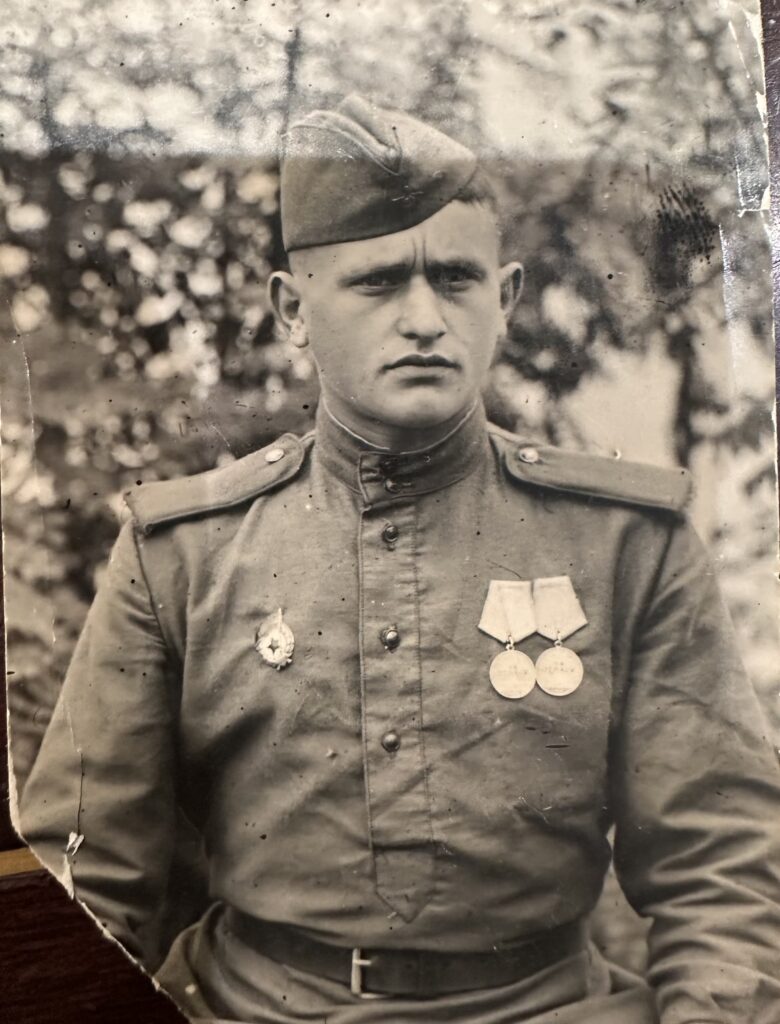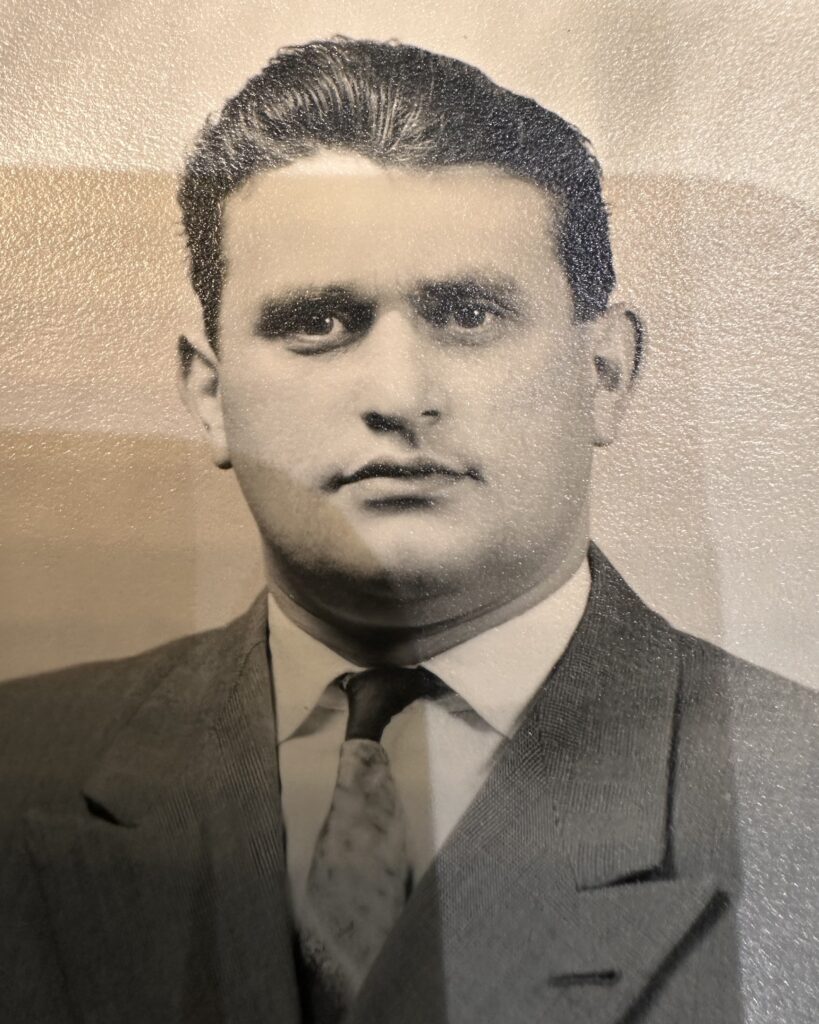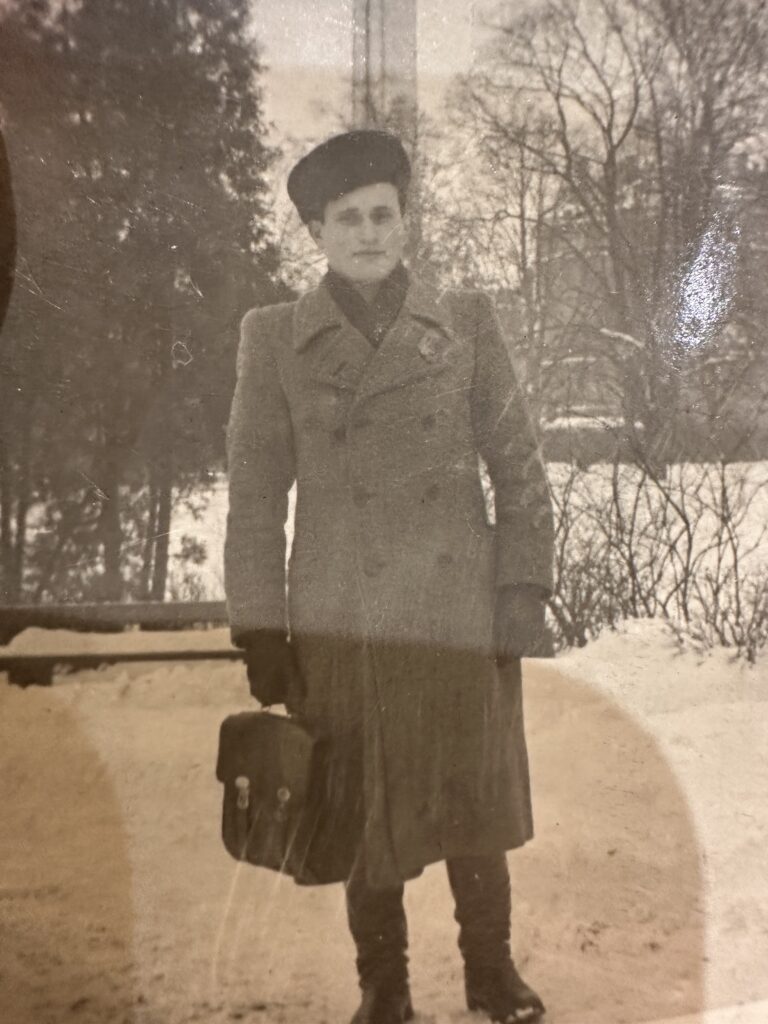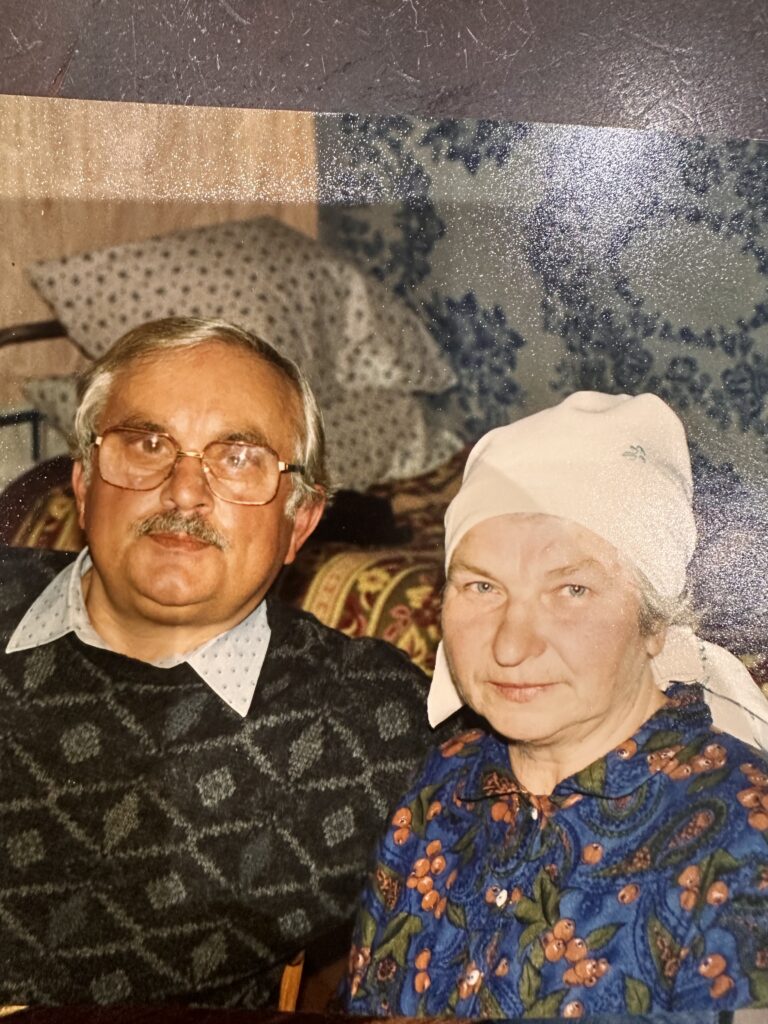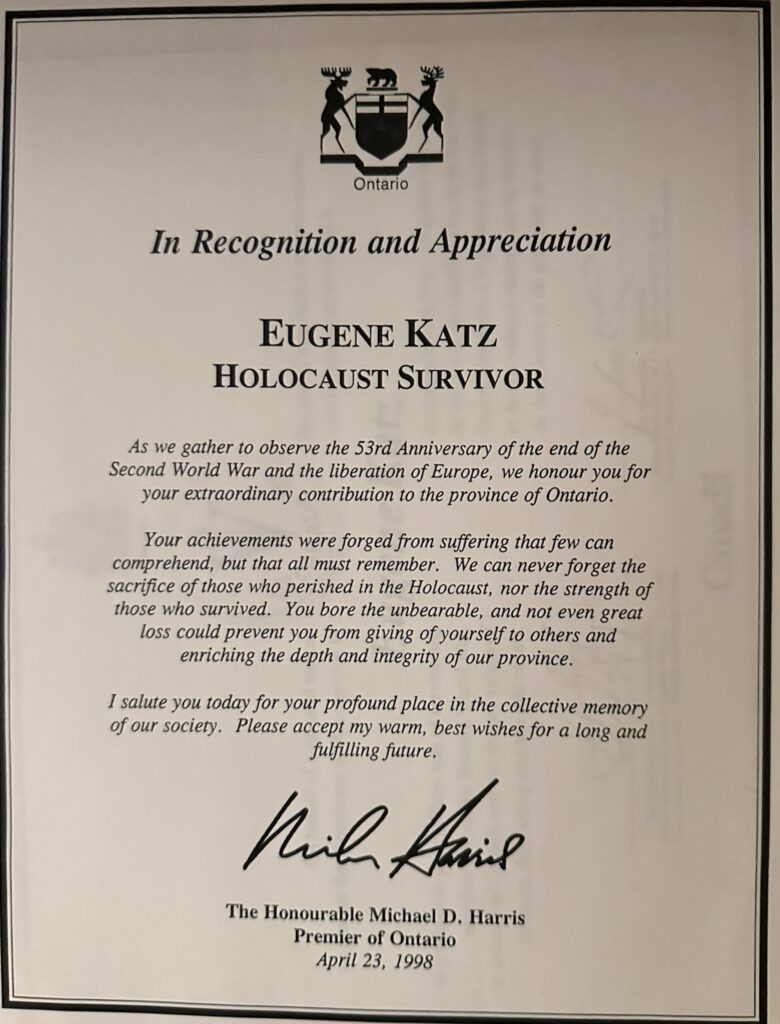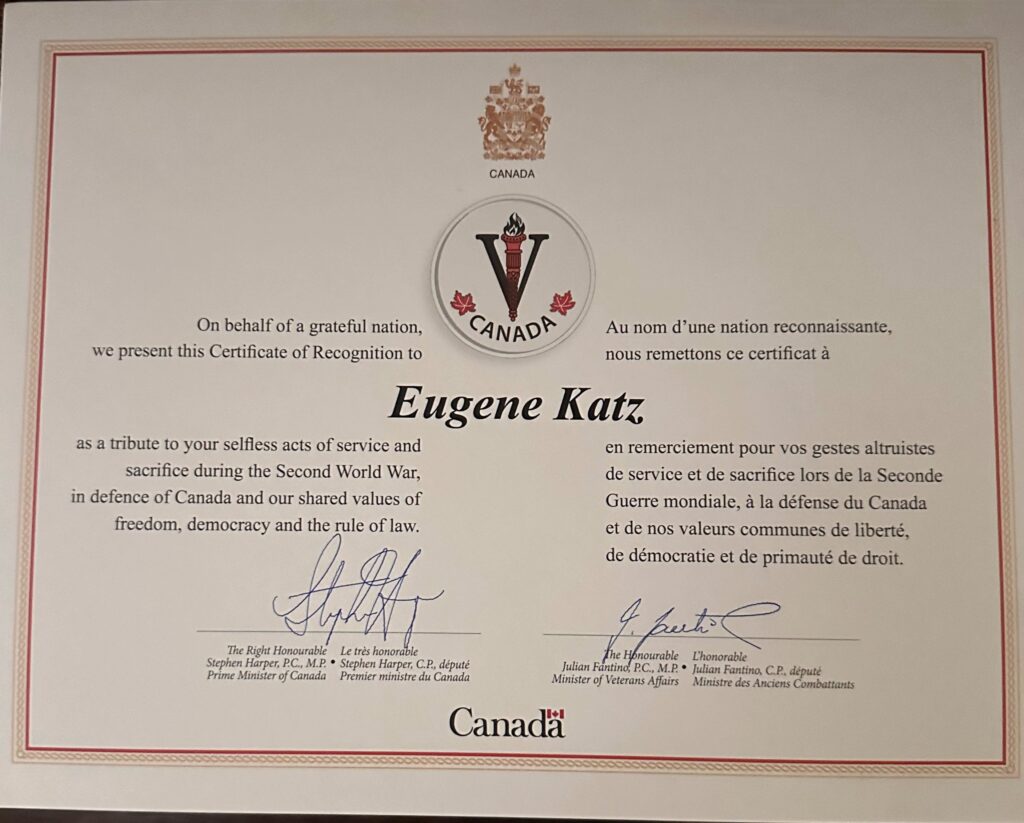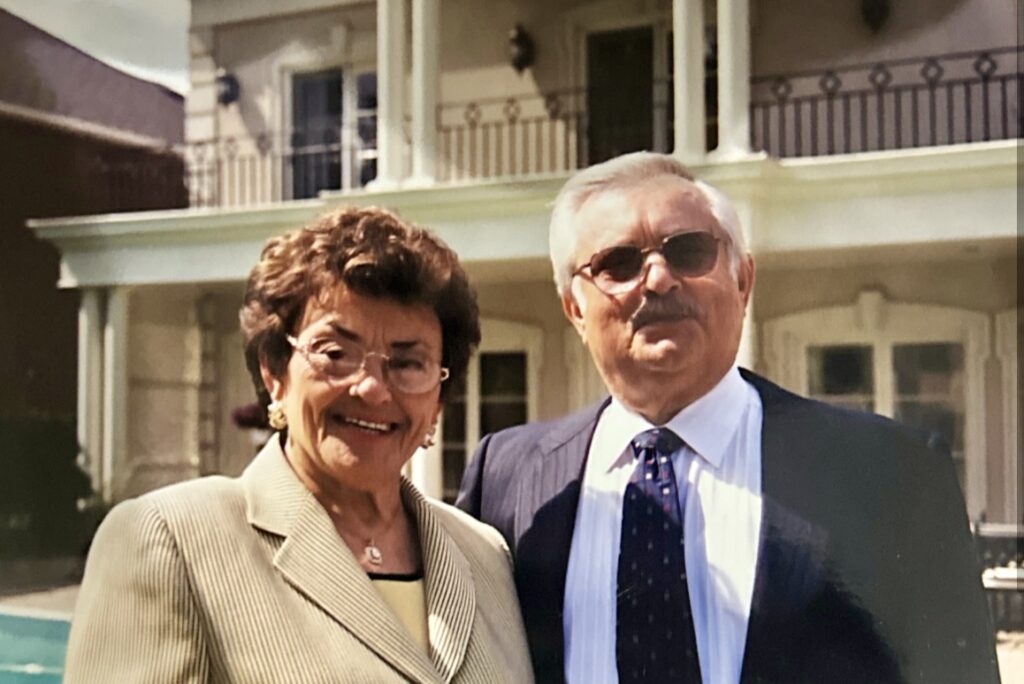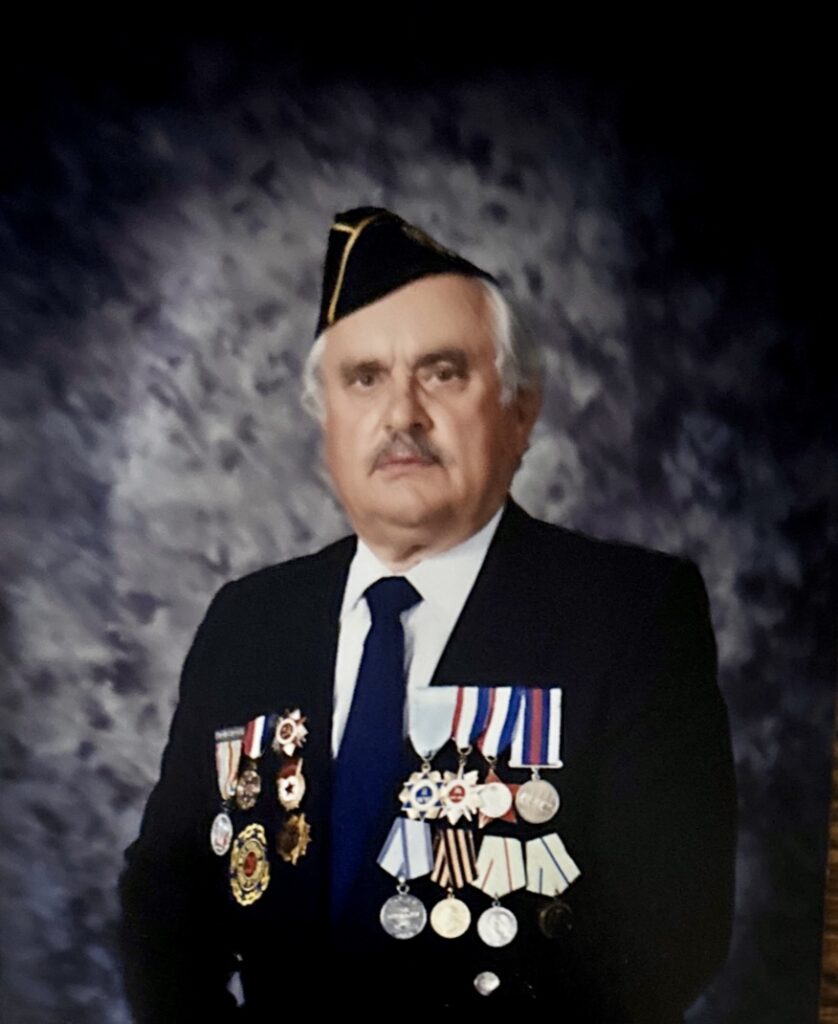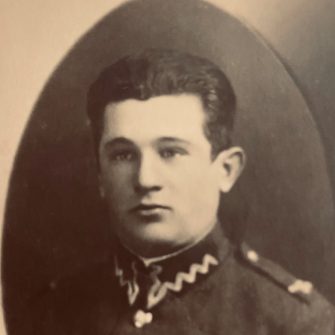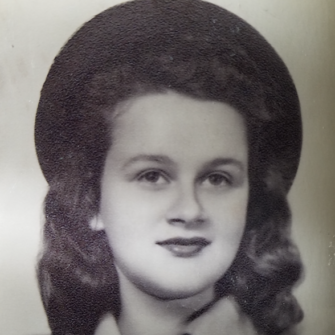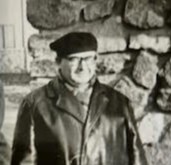Eugene (Zalman) Katz was born in the small village of Dzisna in eastern Poland on January 6, 1925. He lived with his parents, Leib and Manya, and four older siblings, Ephraim, Sophie, Ida, and Moishe. His father worked as a controller for a lumber company, and his mother was a seamstress. Dzisna was eighty percent Jewish, and antisemitism was not a problem in their community before the war. The village had six synagogues, and Eugene and his siblings learned Hebrew six days a week. They attended a Polish school during the day.
On September 1, 1939, Germany invaded Poland. Under the Molotov-Ribbentrop Pact signed in August 1939 by Nazi Germany and the Soviet Union, Poland was divided between the two powers. On September 17, the Soviets invaded Poland from the east. Dzisna became part of the Soviet Union. Eugene had to attend a Russian school, and his oldest brother was conscripted into the Russian Army.
In June 1941, life drastically changed when Germany broke the Molotov-Ribbentrop Pact and invaded the Soviet Union. As the German Army advanced towards Dzisna, the Katz family fled to the home of their non-Jewish friends, the Zurawskis, where they stayed for two weeks. Shortly after the invasion, the Germans occupied Dzisna, and the persecution of the Jewish population followed. The Germans issued a decree stating that all Jews who had fled Dzisna must return. Those who did not heed the decree would be killed when discovered, along with those hiding them.
The Katz family returned to Dzisna, where a ghetto was soon established. Multiple families were confined to a single room, and the conditions were unbearable. Eugene smuggled food from nearby farms into the ghetto to help his starving family survive. His mother died from starvation in the ghetto, and his sister, Ida, was killed in a nearby village, where a gentile farmer hid her.
At the age of sixteen, the Germans forced Eugene to perform brutal manual labor. In the winter, the Germans demanded that the work groups shovel the snowy roads in the bitter cold without proper clothing, and many Jews died from exposure or were shot when they collapsed from the conditions.
On the foggy morning of June 15, 1942, German soldiers liquidated the Dzisna Ghetto. They forced the Jews into a large house on the outskirts of Dzisna as non-Jewish villagers dug a pit nearby. Eugene heard machine gun fire and warned the others to escape. He jumped out of a window and ran.
Nearly all of Dzisna’s 5,000 Jews were murdered, including Eugene’s sister, Sophie, and his father. Eugene and his brother, Moishe, survived the massacre. Hundreds of Jews managed to escape into nearby swamps, aided by the fog, but many were caught by local farmers who turned Jews over to the Germans and their collaborators. Eugene and Moishe were among only 12 survivors. Eugene hid in the Kruki swamps, where he built a raft from tree limbs and vines and scavenged for food. He eventually reunited with his brother Moishe. The brothers were aided by twelve-year-old Valentina Demeshko, the daughter of a family friend, who brought food and water to their hiding place.1
Eugene didn’t want to hide any longer. He had heard of armed resistance in the area, and he wanted to fight back. Eugene managed to procure a machine gun and, in October 1942, the brothers joined a Russian partisan group led by an antisemite named Kanapelka. After two months, the brothers left Kanapelka’s group and joined a brigade with more Jewish fighters. Their new partisan brigade was led by a Russian commander named Polikov and was primarily composed of Jews who had escaped from nearby ghettos. As a partisan, Eugene participated in missions to destroy German communications and transportation.
The winter of 1943 was harsh and bitter. On January 6, 1943, Eugene, Moishe, and a partisan officer traveled to the home of the Zurawskis, the Polish friends of Katz, to retrieve winter clothing they had left there. The Zurawski brothers greeted them with food and drink. However, while the Jewish partisans were enjoying the warmth of the home and sustenance, they didn’t notice that the brothers had sneaked away and betrayed them to the Germans. German authorities and the Chief of Police of Dzisna, a man named Juskevitz, who was a well-known collaborator, burst through the door and caught the partisans off guard.
They tied Eugene’s right hand to his brother’s left. The partisans were taken outside to be shot. While the Germans were binding the partisan officer’s hands together, Eugene managed to untie the rope, and the brothers attempted to escape, running in different directions. Moishe and the partisan officer were tragically shot, but Eugene fled into the swamps.
When Eugene returned to the partisan camp, he told his commander—Polikov—what had happened and asked for permission to take revenge on the Zurawskis. His request was granted. Eugene, along with four other partisans, stormed into the Zurawski house one day. The brothers were taken outside and shot.
Eugune left the Dzisna area after the death of the Zurawskis brothers. Too many people in the village and his previous partisan group, led by the antisemite, Kanapelka, wanted Eugene killed for his actions. Eugene joined the Suborov Brigade in the Minsk area, assisting in missions to derail trains, destroy bridges, block roads, and disrupt German communications.
In August 1943, Eugene’s brigade took part in “War of the Rails,” a large-scale operation to destroy German railroads that involved an estimated 95,000 partisans. Eugene and his fellow fighters placed dynamite on the tracks, and when a train approached, they pulled a tripwire that detonated the dynamite, blowing the train off the tracks.
When the Soviets liberated the area in the summer of 1944, many partisans were drafted into the Russian Army. Eugene served in the Russian Army in the Uszachy Brigade. He soon learned that the Russian Army considered Jewish partisans expendable. They readily threw them into battles before their troops arrived.
Wounded while operating a machine gun on the frontlines in August 1944, Eugene was transferred by train to a hospital. As the train passed Dzisna, Eugene jumped off to see what had become of his family and his village. His family’s home was destroyed, and he discovered that he was the only survivor in his family. Eugene helped locate and arrest collaborators in the area before returning to the Russian Army.
Eugene was in combat with the Russian Army until May 8, 1945, when Germany surrendered. In August 1945, Eugene and his division were deployed to Japan to support the Americans in the Pacific Theater. His division was just one day away from reaching Japan when they learned that Japan had surrendered and the war was over. Eugene’s unit was then transferred to Kazakhstan to quell civil unrest.
After serving for two years as a partisan and three years in the Russian Army, Eugene was discharged. He moved to Riga, Latvia, in 1946 at the age of twenty-one. There, he met and married his wife, Mara, in 1949.
In 1957, Eugene and Mara moved to Poland before immigrating to Canada with their son in 1960. Eugene and Mara rebuilt their life in Canada, and Eugene started a prosperous furniture manufacturing business. He was also involved with the Jewish War Veterans organization. Eugene and Mara had one son and three grandchildren. Eugene passed away in 2018.
1 Valentine Demesheko was recognized by Yad VaShem as one of the Righteous Among the Nations, following Eugene’s submission of her life-saving acts during the Holocaust.

